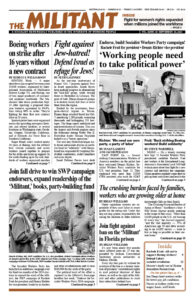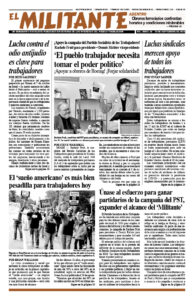In a path-setting victory, for the first time the 28,000 flight attendants at American Airlines will be paid for time spent boarding passengers as part of a new contract voted up Sept. 12. It was one of the Association of Professional Flight Attendants union’s key demands. They are the first organized flight attendants to win wages for the time spent helping customers board, stow their carry-on luggage, get seated and to leave the plane after landing, not just when the doors are closed.
Some 87% voted in favor of the five-year contract. It also includes wage increases of up to 20.5%, some retroactive pay, and increased compensation for flight attendants’ wait times between flights. The last contract expired in 2019.
Hamstrung by the notorious anti-labor Railway Labor Act, which deems them “essential” workers and hobbles them from striking, the union held numerous picket lines at airports across the country to build support during their five-year fight for a new contract.
Far from the glamorous vision the airlines peddle, new hires at American were only making $27,000 before taxes, with some forced to apply for food stamps and public housing assistance to get by.
And like many other workplaces, American never replaced all of the workers they cut during the COVID-19 epidemic, forcing those on the job to carry heavier workloads.
Similar conditions face flight attendants at other airlines, including members of the Association of Flight Attendants-CWA at United. They voted Aug. 28 to authorize a strike, a precondition for seeking release from the National Mediation Board to strike after a 30-day “cooling off” period. The last strike at a U.S. airline was in 2010.
On Aug. 14 flight attendants at Alaska Airlines rejected their bosses’ latest contract offer by 68%. Also organized by the Association of Flight Attendants-CWA, workers said that while the proposed contract included a wage raise and offered boarding pay, it did not address the unpredictable work schedules or lower pay rates for new hires.

